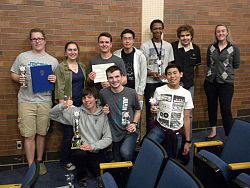Juan Diego CHS senior claims top prize at regional science fair
Friday, Apr. 24, 2015

JDCHS
+ Enlarge
Soaring Eagle students captured a number of awards at the Salt Lake Valley Science & Engineering Fair. Alexander George-Kennedy (seated, left) was the grand prize winner. Rex Alley also performed exceptionally well, claiming first place in chemistry and receiving two special awards. Courtesy photo/JDCHS
DRAPER — Students attending public and private schools in grades 5-12 in the greater Salt Lake area participated at the Salt Lake Valley Science & Engineering Fair March 24-26, with Utah Catholic students achieving 47 of the more than 250 awards. Juan Diego Catholic High School senior Alexander George-Kennedy was named the grand prize winner and will represent Utah at the International Science and Engineering Fair May 10-16 in Pittsburgh, Penn.
In addition to the top prize, George-Kennedy won the Intel Excellence in Computer Science Award and second place in the Computer Science Senior Division for his project “Binary Classification of MRI Data to Diagnose Patients with Autism Spectra Disorder.”
“My project had the goal of creating a program to diagnose autism quickly and efficiently in patients,” said George-Kennedy, whose prizes included an $80,000 scholarship to Westminster College.
His experiment analyzed data from patients’ MRI scan.
“The challenge was in getting the program to recognize what characteristics the fMRI data from a patient with autism had, and what differences there were between the data of a healthy and autistic patient. In essence, pretty much the whole project was data analysis,” said George-Kennedy.
Due to the nature of his project it wasn’t based on a hypothesis.
“It was more of a design goal; that is, a diagnosis accuracy rate of above 90 percent. I set that number arbitrarily, just something to try and get to,” said George-Kennedy.
The current accuracy rate for such a diagnosis is about 82 percent, “meaning, if you give the program the data of a patient, it will diagnose the patient correctly about 82 percent of the time. The remaining error is equally likely to be a false positive or a false negative,” said George-Kennedy.
He decided to present this project because it’s applicable and an original line of research.
“It’s not a demonstration of already known scientific concepts, but rather could be an improvement to the status quo,” said George-Kennedy who invested about eight months to develop the project and is still working on it to improve accuracy and performance. He enjoys research and hopes to study biomedical engineering in conjunction with materials science in order to develop artificial prosthetics, he said, but “I also like mathematics a great deal, so perhaps I’ll change my mind and decide to study that,” he said.
Despite his success, he doesn’t feel he has the ability to give advice to his classmates, he said.
“My GPA isn’t the standard perfect 4.0 that many of my classmates who went to the science fair with me have. … I wouldn’t say, ‘believe in yourself,’ necessarily, but I do fully and completely think that ultimately, everything will turn out pretty okay for all of us,” said George-Kennedy, adding that he is very grateful to Dr. Celestino, the science teacher who helped him apply to the science fair and deal with the logistics of the process.
For questions, comments or to report inaccuracies on the website, please CLICK HERE.
© Copyright 2024 The Diocese of Salt Lake City. All rights reserved.
© Copyright 2024 The Diocese of Salt Lake City. All rights reserved.

Stay Connected With Us